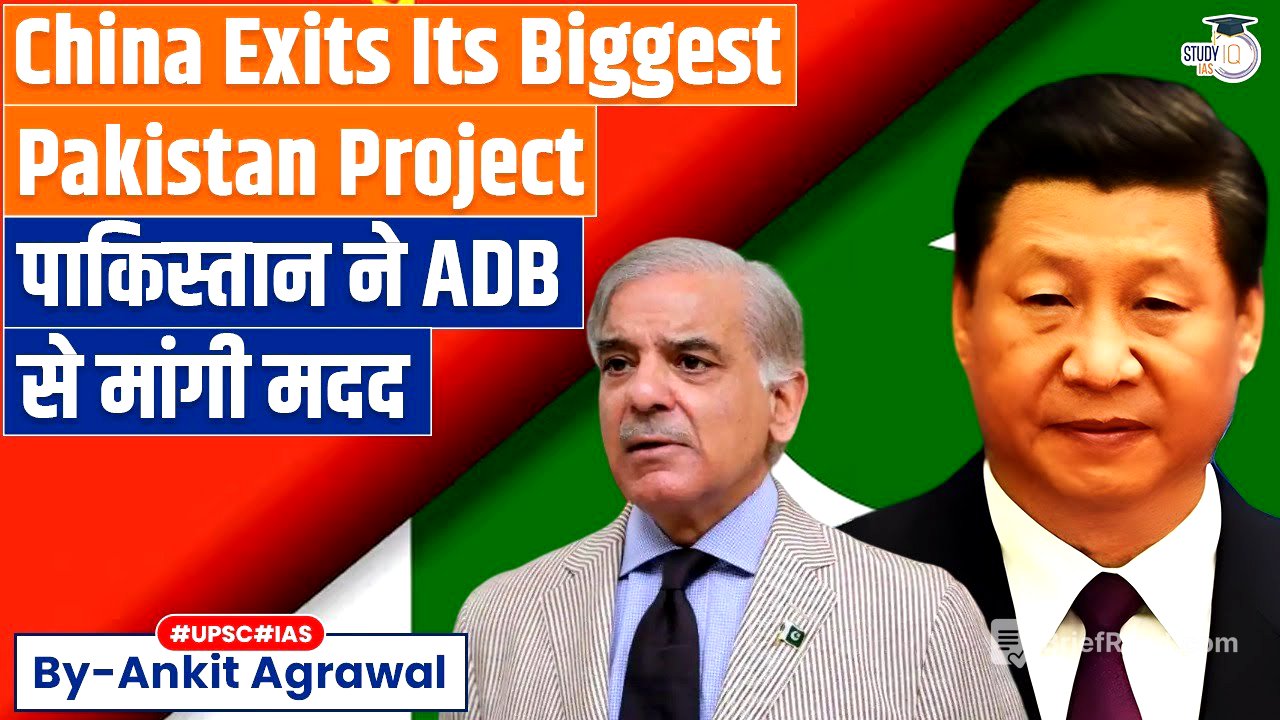TLDR;
The video discusses China's exit from the Main Line One (ML-1) railway project in Pakistan, a key part of the China-Pakistan Economic Corridor (CPEC). It explores the reasons behind this decision, including security concerns, financial constraints, and political risks. The video also touches upon Pakistan's response, its turn to the Asian Development Bank (ADB) for funding, and the strategic implications of these developments for both Pakistan and the broader region.
- China exits the ML-1 railway project, a major part of CPEC.
- Security concerns, financial constraints, and political risks are key reasons for China's withdrawal.
- Pakistan seeks funding from ADB and faces strategic and economic implications.
Introduction [0:00]
The video starts by highlighting the strong friendship between China and Pakistan, with China investing heavily in Pakistan, particularly through the China-Pakistan Economic Corridor (CPEC). The presenter notes that China has exited from the biggest project in CPEC, a railway project. The video will explore the reasons behind China's exit, the project's details, and Pakistan's response, including seeking help from the Asian Development Bank (ADB).
What is ML-1 Project? [1:16]
The ML-1 project, or Main Line One, is a railway project intended to upgrade the railway artery from Karachi to Peshawar. The presenter shows a map of Pakistan, pointing out the provinces of Balochistan, Khyber Pakhtunkhwa, Punjab, and Sindh, where Karachi is located. The project aims to modernise the existing railway line by doubling the tracks, acquiring land, rehabilitating affected people, installing modern signalling systems, and upgrading the design speed to allow passenger trains to run at 140-160 km/h. The enhancement of the freight corridor is also a key component, making this project the backbone of Pakistan Railways, used for transporting goods and passengers to Peshawar. The total length of the railway line is about 1700 km.
Timeline of the Project [3:45]
The Main Line One project was conceived in 2015-16 as part of the CPEC project, aimed at boosting Pakistan's economy. However, the project faced delays for four years, leading to cost escalation. Pakistan was also hesitant to provide a sovereign guarantee for Chinese financing, fearing potential losses and the inability to repay. From 2023 to 2024, there were targeted attacks on Chinese workers, causing concern in China. In March 2024, a deadly suicide attack in Shangla killed Chinese engineers, prompting Beijing to request permission to deploy Chinese security forces in Pakistan to protect its workers. Pakistan was reluctant due to domestic pressure, and eventually, China withdrew from the project. Pakistan is now seeking a $2 billion loan from the Asian Development Bank (ADB).
Why China Stepped Back [6:01]
China stepped back from the ML-1 project due to several reasons. Firstly, there were frequent attacks on Chinese workers and projects, especially in Balochistan by the Baloch Liberation Army. Secondly, China demanded stronger protection measures, which Pakistan couldn't meet. Thirdly, China is facing its own debt crisis, and IMF programs restrict Pakistan from providing sovereign guarantees. The rising project costs made it unattractive for Chinese lenders. Lastly, there were political and reputational risks due to the high-profile casualties, which negatively impacted China's Belt and Road Initiative image.
Pakistan's Response [7:38]
Pakistan is seeking $2 billion from the Asian Development Bank (ADB) to continue the project, but this amount is insufficient to upgrade the entire railway line from Peshawar to Karachi. Pakistan aims to at least upgrade the section from Rohri to Karachi, which is crucial for inland freight and transporting goods to Karachi Port. This section is also important for transporting minerals from the Reko Diq gold and copper mine in Balochistan. This marks the first time a core CPEC project will be funded by a multilateral bank instead of China.
Implications for Pakistan [8:53]
If the ADB provides the loan, only the Karachi to Rohri section will be completed, leading to partial progress and delays in the full ML-1 project. This will result in fewer job creations, reduced freight efficiency, and delayed revenue benefits. The ADB's stricter transparency and procurement rules, unlike Chinese loans, will also impact fiscal policy. The decline in Chinese dominance in CPEC may lead to diversification of funding sources. Pakistan still needs to prove it can ensure the safety of Chinese workers, as China still has significant investments in the country.
India's Role [10:01]
The presenter addresses the question of whether India played a role in China's withdrawal from the project, especially given recent meetings between PM Modi and Xi Jinping. The presenter clarifies that this issue is not related to India. Despite improved relations, India still opposes CPEC due to sovereignty concerns, as it passes through Pakistan-occupied Kashmir (POK). India-China relations are not yet at a level where China would halt projects in Pakistan at India's request. India's opposition to CPEC remains unchanged.
Strategic and Political Consequences [11:09]
China and Pakistan's relationship is undergoing a recalibration, not a breakup. China remains a key player in Pakistan's energy, defense, and infrastructure sectors. The withdrawal is a setback for the Belt and Road Initiative (BRI) narrative. Regionally, the ADB's involvement dilutes China's exclusive hold on CPEC, potentially opening space for Indian, US, and Western-backed institutions in Pakistan.
Security Angle [11:54]
Balochistan insurgents and militant groups have repeatedly attacked Chinese-linked sites. Pakistan has deployed special security forces to protect Chinese workers, but it remains to be seen how effective these measures will be.
What Next? [12:22]
China and Pakistan might resume negotiations, leading to China's return to the ML-1 project. Multilateral financing may increase, with ADB and other funds providing support to Pakistan. Delays persist, and funds remain insufficient. The ML-1 project might be developed in smaller segments.
Conclusion [12:50]
China's withdrawal from the ML-1 project, the largest CPEC project, is a turning point. It reflects security threats, Pakistan's fiscal distress, and China's increasing caution. The presenter hopes the video has clarified the situation and encourages viewers to answer a question about mountain passes, with the answer available on Instagram and Telegram. The presenter also promotes StudyIQ IAS courses with a discount code.









